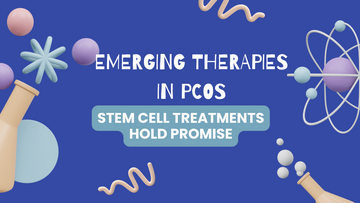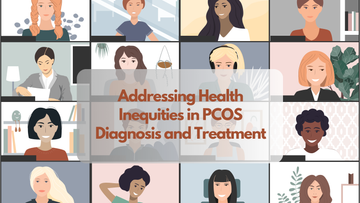I have been asked quite often about the cross over between PCOS and Type 2 Diabetes. Often If the clinical scenario warrants, I will prescribe Metformin for my PCOS patients and I always give a resounding “You don’t have Diabetes but…”. PCOS is a condition that affects women's hormone levels and there is a significant connection with insulin resistance and diabetes. Improving insulin sensitivity is a critical component for managing both PCOS and insulin resistance. In this regard, there is a common link between PCOS and insulin resistance, up to 70% of PCOS is caused by insulin resistance.
While I prescribe a Type 2 Diabetes drug I also give patients a list of natural supplements that are well studied and have been shown to be effective in improving symptoms when added to the regimen. One such supplement that I insist most patients take is Myoinositol.
Myoinositol is a type of sugar alcohol that is commonly used as a supplement to help regulate blood sugar levels. Metformin is a medication commonly used to support patients with PCOS and type 2 diabetes by helping to control blood sugar levels by improving insulin sensitivity. The question of whether Myoinositol works with Metformin is a common one among individuals with PCOS who are looking for additional means of managing their condition.
Metformin and Myoinositol to Manage Insulin
Let's look at the data. Several studies have been conducted to determine if Myoinositol works in combination with Metformin to improve blood sugar control in people with type 2 diabetes. In one study, researchers found that the combination of Myoinositol and Metformin resulted in better blood sugar control than Metformin alone. The study showed that participants who took both Myoinositol and Metformin had lower fasting blood sugar and better insulin sensitivity compared to those who only took Metformin.
Another study conducted on women with polycystic ovary syndrome (PCOS) found that the combination of Myoinositol and Metformin was more effective in improving insulin sensitivity and glucose metabolism than Metformin alone.
On the other hand, some studies have reported conflicting results. When using Myoinositol with Metformin alone, no study to date has shown the addition of other supplements such as Chromium, Cinnamon, Turmeric and Berberine, which have been studied individually and have shown to improve insulin sensitivity.
Overall, the evidence to support the use of Myoinositol in combination with metformin is mixed. While some studies* suggest that the combination may be effective in managing blood sugar levels, others have reported no significant difference between the combination and Metformin alone. However, given the potential benefits of Myoinositol and its well-known safety profile, it may be worth considering for individuals with type 2 diabetes or PCOS. There really is no down side and would even consider starting the supplements first then adding in the pharmaceuticals if there is delayed intended response.
While the evidence is not definitive, there is strong support for the use of Myoinositol in combination with Metformin to improve blood sugar control in people with Insulin Resistance and PCOS. Future research is necessary to further explore the potential benefits of this combination therapy and to determine the most effective dosages and treatment regimes. As always, individuals with diabetes or any underlying disease should be working with their physician to come up with the best treatment plan that incorporates lifestyle modifications as well as evaluating the need for pharmaceuticals in the proper indication.
*Sources:
Metabolites. 2022 Dec; 12(12): 1183. Published online 2022 Nov 26. doi: 10.3390/metabo12121183
PMCID: PMC9786218PMID: 36557221
Myoinositol vs. Metformin in Women with Polycystic Ovary Syndrome: A Randomized Controlled Clinical Trial
Pernille Ravn,1,2,* Freja Gram,1,2 Marianne S. Andersen,3 and Dorte Glintborg3












